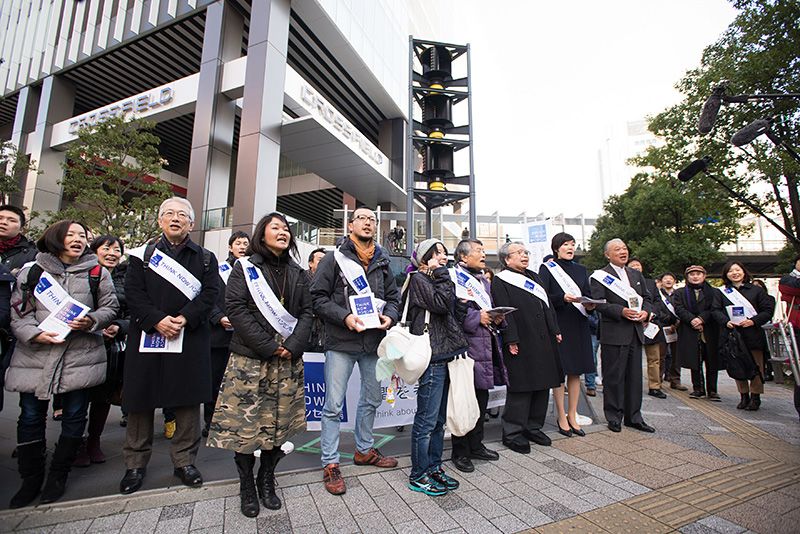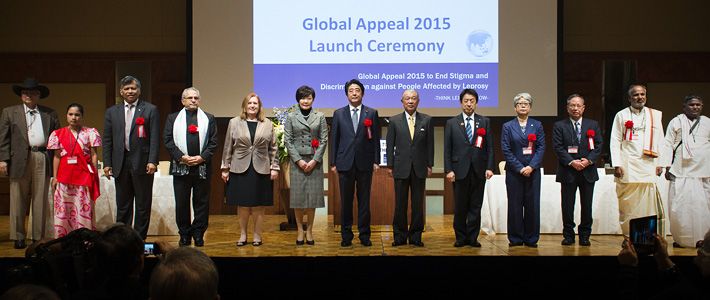
Leprosy as a Human Rights Issue
Politics Society- English
- 日本語
- 简体字
- 繁體字
- Français
- Español
- العربية
- Русский
More than Just a Medical Issue
An effective medical treatment for leprosy was introduced back in the 1980s. This means that the disease is now fully curable if promptly detected, with no lingering damage to the patient. Leprosy also has a very low level of infectivity, making it impossible to contract it from someone who has recovered from the disease—or even from someone currently suffering from it, as long as the patient is undergoing the multi-drug therapy used to cure it. However, prior to the introduction of that effective treatment, the disease could result in disfigurement if unchecked, which led to a worldwide belief from ancient times that the disease was somehow an occupational disease or affliction from heaven. Even today there remains deep-rooted prejudice and discrimination against persons affected by leprosy.
Beginning in the Meiji era (1868–1912), Japan followed a policy of isolating leprosy patients from society. This meant that those suffering from the disease were not allowed to have children and had to spend their entire lives in a sanitarium. The isolation policy was finally brought to an end in 1996, and in 2001 persons affected by leprosy won the right to compensation from the government. The progress in implementing these measures allowed persons affected by leprosy to finally secure their freedom and regain their dignity. One outcome, however, has been that the average age of those living in sanitariums now is over 80, which means that they have no choice but to remain there.
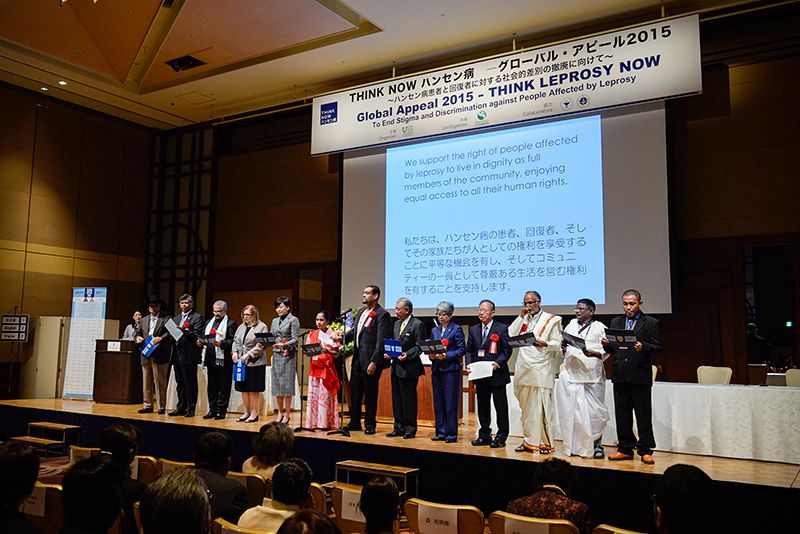 Responding to the human rights issues related to leprosy requires educating people around the world about the disease to unravel misunderstandings. The Global Appeal to End Stigma and Discrimination against People Affected by Leprosy was launched toward that end. Every January on World Leprosy Day, the Global Appeal is issued as a declaration to the international community. The tenth Global Appeal was issued in 2015 from Tokyo, marking the first time for the declaration to be made in Japan.
Responding to the human rights issues related to leprosy requires educating people around the world about the disease to unravel misunderstandings. The Global Appeal to End Stigma and Discrimination against People Affected by Leprosy was launched toward that end. Every January on World Leprosy Day, the Global Appeal is issued as a declaration to the international community. The tenth Global Appeal was issued in 2015 from Tokyo, marking the first time for the declaration to be made in Japan.
A Host of Dignitaries Lend Their Support
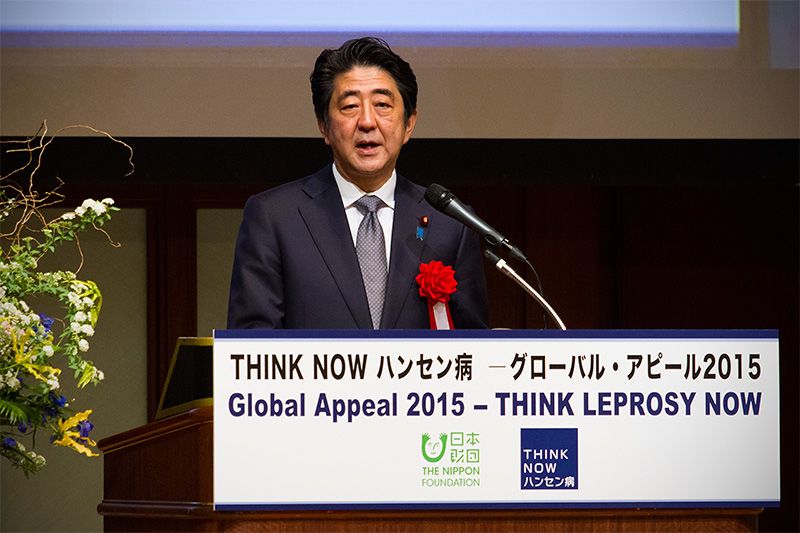 The January 27 Global Appeal ceremony in Tokyo was attended by Prime Minister Abe Shinzō and Health, Labor, and Welfare Minister Shiozaki Yasuhisa, as well as by dignitaries including Dr. José Manuel Ramos-Horta, the former president of Timor-Leste; Dr. Surin Pitsuwan, former secretary-general of ASEAN; and former leprosy patients from Japan and foreign countries, along with members of supporting organizations. In total, 260 people were on hand to attend the event.
The January 27 Global Appeal ceremony in Tokyo was attended by Prime Minister Abe Shinzō and Health, Labor, and Welfare Minister Shiozaki Yasuhisa, as well as by dignitaries including Dr. José Manuel Ramos-Horta, the former president of Timor-Leste; Dr. Surin Pitsuwan, former secretary-general of ASEAN; and former leprosy patients from Japan and foreign countries, along with members of supporting organizations. In total, 260 people were on hand to attend the event.
In his remarks at the ceremony, Prime Minister Abe spoke of the past isolation policies of Japan and the infringements of the human rights of persons affected by leprosy, as well as the discrimination and prejudice aimed at them. “Reflecting on this history,” he noted, “about 20 years ago Japan implemented a major change in policy. We offered apologies and assistance to former leprosy patients, and implemented measures [for them] to recover their honor. . . . Meanwhile, there are currently more than 1,700 recovering leprosy patients in leprosy treatment centers. . . . We will strive to enable these recovering patients to continue to live a calm life with peace of mind, and also to achieve the elimination of leprosy-related prejudice and discrimination.”
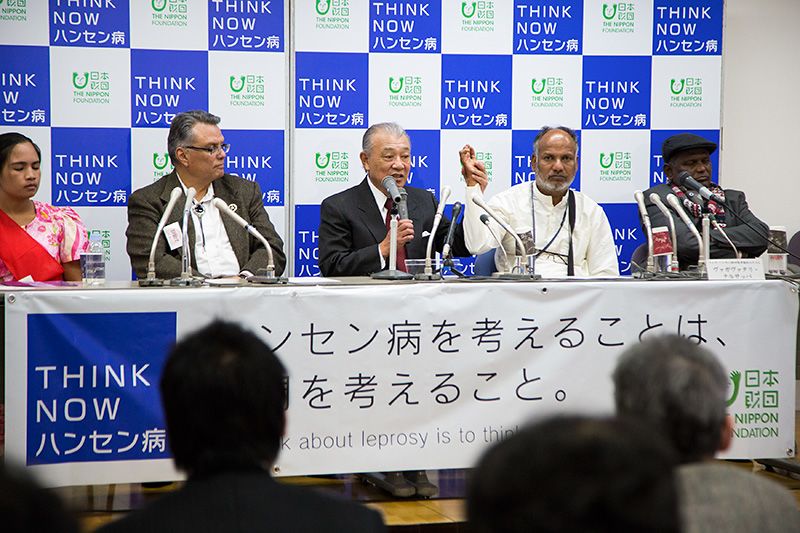 Sasakawa Yōhei, the chairman of the Nippon Foundation and WHO Goodwill Ambassador for Leprosy Elimination, alongside recovered leprosy patients at the press conference following their meeting with the Emperor and Empress of Japan.
Sasakawa Yōhei, the chairman of the Nippon Foundation and WHO Goodwill Ambassador for Leprosy Elimination, alongside recovered leprosy patients at the press conference following their meeting with the Emperor and Empress of Japan.
On January 28, recovered leprosy patients from Ethiopia, India, Indonesia, Japan, the Philippines, and the United States who had attended the ceremony on the previous day visited Emperor Akihito and Empress Michiko. Their majesties conveyed their hope that the activities of these leaders will benefit those in their countries who are suffering from the disease and from discrimination. After meeting the imperial couple, Vagavathali Narsappa, president of the Association of People Affected By Leprosy in India, spoke about the moving meeting: “It was an unbelievable experience for me. Even though members of my own family would not shake my hand, today the Emperor and Empress reached out and grasped it. It made me feel like the pain and suffering just disappeared.”
A Global Effort to End Discrimination
The Nippon Foundation, which has sponsored the Global Appeal since its inauguration, began its effort to support initiatives related to leprosy back in the 1960s. During the five-year period from 1995 to 1999, the organization distributed free medication to treat leprosy via the World Health Organization. In the years since, the foundation has continued that free distribution effort via the pharmaceutical company Novartis. Through such initiatives, the Nippon Foundation has been providing wide-ranging support in Japan and overseas to achieve the goal of eliminating leprosy.
In 2005, India, which had the largest overall number of leprosy patients, eliminated leprosy as a public health problem by reaching the WHO benchmark of having fewer than one case per 10,000 people. After that landmark achievement, the Nippon Foundation shifted its focus to the issue of addressing the social aspects of the leprosy issue, such as the discrimination and prejudice directed toward those affected by the disease. The foundation called on human rights advocates worldwide to assist in this effort, gaining support from such leaders as former US President Jimmy Carter, the fourteenth Dalai Lama of Tibet, and Archbishop Emeritus of Cape Town Desmond Tutu, as well as Nobel Peace Prize laureates and national political leaders from around the globe. These dignitaries agreed to lend their names in support of the first Global Appeal, which was issued in Delhi in January 2006.
Since then, the Global Appeal has enjoyed the support of a broad spectrum of individuals and groups, including recovered leprosy patients around the world, international human rights organizations, religious and business leaders, the presidents of 110 universities in 64 countries, worldwide health groups, and legal organizations, as well as groups that are active in the effort to end discrimination against those affected by leprosy and other sympathetic groups. For some of the regions where the Global Appeal was issued, the event served as a springboard to the creation of organizations for former leprosy patients and the full-scale effort to end disease-related discrimination. When the International Bar Association sponsored the 2013 Global Appeal, it marked the beginning of that organization’s movement to eradicate discriminatory laws related to leprosy from the books of countries around the world. Similarly, the human-rights organizations that jointly issued the 2014 Global Appeal with the Nippon Foundation subsequently sought to include the issue of leprosy within their own activity agendas. In these ways, the Global Appeal has positively impacted the international community.
The 2015 Global Appeal was issued by the Nippon Foundation together with the International Council of Nurses and nursing associations from other countries, reflecting the standpoint of nurses who are fighting leprosy alongside their patients. The Global Appeal incorporated the nursing viewpoint with a statement that read in part: “As the world’s largest group of health professionals, nurses are committed to alleviating physical and mental suffering and promoting the health of all people, without prejudice. We understand the importance of equitable access to health services and of educating the public about disease—especially a misunderstood disease such as leprosy.”
Preserving the Memory of Past Struggles
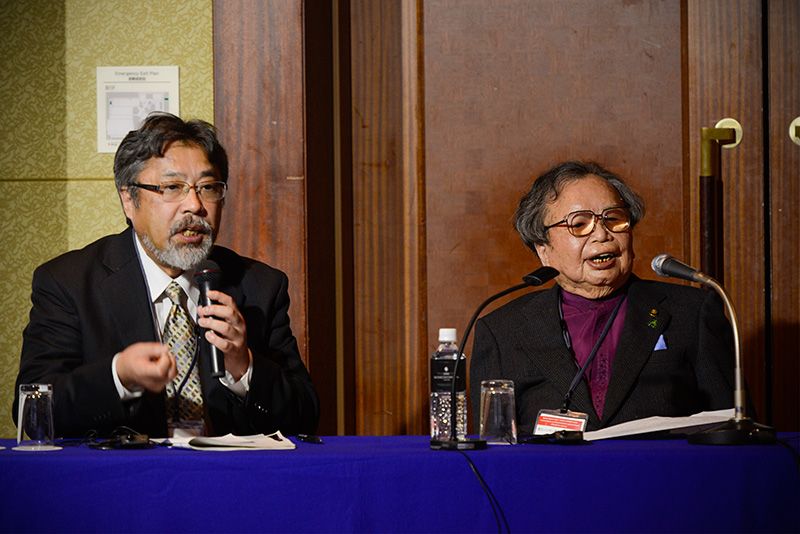 Hirasawa Yasuji (right), a member of the Steering Committee of the National Hansen’s Disease Museum, and Kuroo Kazuhisa, the chief curator of the National Hansen’s Disease Museum, recount their own experiences at the “Why Leprosy Now?” symposium.
Hirasawa Yasuji (right), a member of the Steering Committee of the National Hansen’s Disease Museum, and Kuroo Kazuhisa, the chief curator of the National Hansen’s Disease Museum, recount their own experiences at the “Why Leprosy Now?” symposium.
The reason for announcing this year’s Global Appeal in Japan, where the disease was eliminated quite some time ago, was to preserve the memories and history of the tragedy surrounding leprosy. Now that most of the people affected by leprosy have grown old, there are limited opportunities to hear first-hand accounts from those affected by the disease. The ceremony for the Global Appeal was followed by an international symposium titled “Why Leprosy Now?” The panelists for the discussion included Hirasawa Yasuji of the National Sanatorium Tama Zenshōen in Japan; Vagavathali Narsappa, president of the Association of People Affected By Leprosy in India; Dr. Arturo Cunanan Jr., the head of a general hospital in the Philippines; and Artur Custodio Moreira de Sousa, the national coordinator of an organization in Brazil that assists persons affected by leprosy. Each of the panelists shared some of their own experiences. A panel discussion was also held involving young staff members from Brazil, China, and Thailand, who will be the leaders of future efforts to address leprosy-related issues.
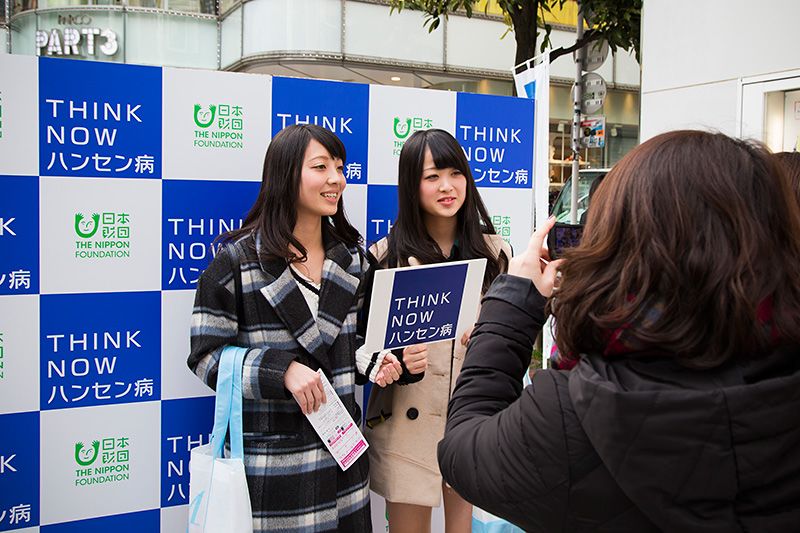 Another initiative is the “Think Leprosy Now” video message campaign that aims to provide opportunities for people who have not had much interest in leprosy to broaden their understanding of the disease and think more deeply about the discrimination and prejudice against those affected by it. So far over a thousand video clips have been collected with pledges to fight leprosy-related discrimination, including messages from Hinohara Shigeaki, the head of St. Luke’s International Hospital in Tokyo; former Prime Minister Mori Yoshirō; and TV personality Matsuko Deluxe.
Another initiative is the “Think Leprosy Now” video message campaign that aims to provide opportunities for people who have not had much interest in leprosy to broaden their understanding of the disease and think more deeply about the discrimination and prejudice against those affected by it. So far over a thousand video clips have been collected with pledges to fight leprosy-related discrimination, including messages from Hinohara Shigeaki, the head of St. Luke’s International Hospital in Tokyo; former Prime Minister Mori Yoshirō; and TV personality Matsuko Deluxe.
(Originally written in Japanese and published on March 3, 2015.)
Nippon Foundation Abe Shinzō human rights leprosy discrimination Imperial Couple
